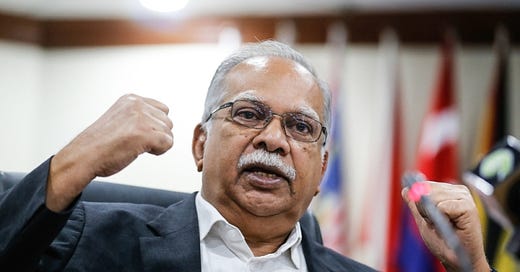Guest Editorial: Retreat or permanent retreat? The Madani government’s struggle for relevance
Prof. Dr. Ramasamy
Retreat or permanent retreat? The Madani government’s struggle for relevance
The Madani government’s retreats raise critical questions: are they genuine efforts to assess the strengths and weaknesses of its administration, or symbolic gestures masking a broader retreat from meaningful reforms?
When a government appears unable or unwilling to implement serious-minded changes, such exercises risk being reduced to expensive public relations stunts.
Retreats, in principle, can be valuable forums for stock-taking, identifying obstacles, and planning the way forward.
However, such benefits are contingent on the existence of clear goals and reform priorities—something the much-hyped Madani government appears to lack.
Without these, these retreats are unlikely to produce actionable outcomes, let alone inspire confidence.
Prime Minister Anwar Ibrahim, once celebrated as a reformist, now seems adrift.
The absence of substantive policy direction, coupled with the survivalist nature of his administration, suggests a government more preoccupied with political longevity than transformative governance.
Ethnic and cultural divisions—historically manipulated for political advantage—are not being addressed meaningfully, further undermining national cohesion.
The lack of competence among ministers compounds the issue.
Many appear to function more as ethnic champions for their respective parties than as capable administrators.
This undermines the government’s ability to craft a broad-based, inclusive reform agenda.
Consequently, lofty rhetoric and promises—whether about foreign investments, international solidarity on issues like Palestine, or vague commitments to reforms—ring hollow.
Furthermore, Prime Minister Anwar’s frequent overseas trips add to the perception of a government disconnected from pressing domestic realities.
While he touts foreign investments and diplomatic victories abroad, there is little visible progress on core domestic issues.
A government that retreats from its objectives risks losing credibility altogether. The Madani government’s failure to address entrenched social and cultural divisions and its retreat from pursuing genuine reforms may signal a deeper, systemic problem: the absence of political will.
Instead of temporary retreats, what the country desperately needs is a sustained focus on reforming governance, addressing inequality, and fostering national unity.
Without these, the Madani government may find itself permanently retreating—not just from its objectives but from the trust of the people it serves.
The views expressed are those of the writer
Prof. Dr. P Ramasamy
Malaysian, 75 years of age. Former professor of political economy UKM. Former Senior Research Fellow, ISEAS. Former Visiting Professor, University Kassel, Germany. Deputy Chief Minister Penang, 2008-2023. Former member of parliament, 2008-2013. Three terms Perai state assemblyman. Former Chairman of Penang Hindu Endowments Board. Involved in peace talks in Aceh and Sri Lanka. International peace consultant. Chairman of political party Urimai.
Subscribe Below:





As an outsider, it's easy to see that the Madani government could easily collapse with some minor shifting of alliances. Is this why Anwar has become a 'do nothing' PM? Is he desperately trying to hold on to power, so much so that reforms--eagerly anticipated in the lead-up to his administration--have now been completely discarded? I think so.
But it's not easy to dump Anwar in favor of someone else. The UG has a shallow bench. There is no talent waiting in the wings and the opposition has a mindset from the middle ages. Malaysia is in trouble.